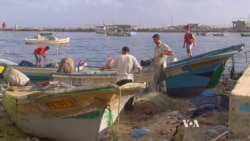Under the Oslo accords of the 1990s, Palestinian fishermen are supposed to be able to fish 37 kilometers (20 nautical miles) off the coast of Gaza, but Israel has tightened that limit to within 11 kilometers (six nautical miles) of the coast due to its security concerns. Israel’s blockade is affecting the already weak economy in the Palestinian coastal enclave.
At dawn, the sound of bullets being fired drifts over the water in Gaza, a sound Palestinian fishermen know all too well.
Israel controls these waters. Since 2007, when the militant Islamist group Hamas took control of Gaza, Israel has tightened its blockade. During this summer’s war, fishing was restricted to about three-and-a-half kilometers (two nautical miles) off the coast.
As part of the latest cease-fire deal, Israel is to allow fishermen to travel about 11 kilometers from shore.
But fishermen like Mohammed al Nijar say they often were shot at or harassed several kilometers before that mark.
“They fire at us at night, with different caliber weapons, and they even throw dirty water at us and they demand that we take off our clothes, and they push us into the cold water and they use the worst kinds of insults,” he said.
Although for now the extension has allowed fishermen to increase their catch, the official zone will soon get fished out.
Fish market seller Abdel Kareem said the extension was just not enough.
“We are not asking for the impossible, we are just asking for our rights. All we need is to extend our fishing area to 22 kilometers (12 nautical miles). That would enable the poor to buy fish at a reasonable price,” he said.
The decision to limit how far Palestinians can go is based on security needs, says Yosef Kuperwasser, director general of the Israeli Ministry of Strategic Affairs.
“Hamas and other elements in Gaza look at the sea as one avenue through which they can either smuggle arms or carry out terrorist operations against Israel,” he said.
Palestinian fishermen live in poverty. Even if they could afford it, material needed to improve their boats, nets and markets have to come through the Israeli blockade.
The crisis in the fishing industry is the result of a wider pattern of crippling restrictions that Israel has imposed in Gaza, said U.N. official Christopher Gunness.
“What we’re seeing is the destruction of the fishing industry, but that’s part of a wider destruction which frankly affects every single sector of the economy of Gaza,” he said.
Life for the roughly 1.8 million people in Gaza likely will not improve until Israel lifts its seven-year blockade, and Israel and Hamas put an end to the repeated conflicts that have crushed the civilian population.






